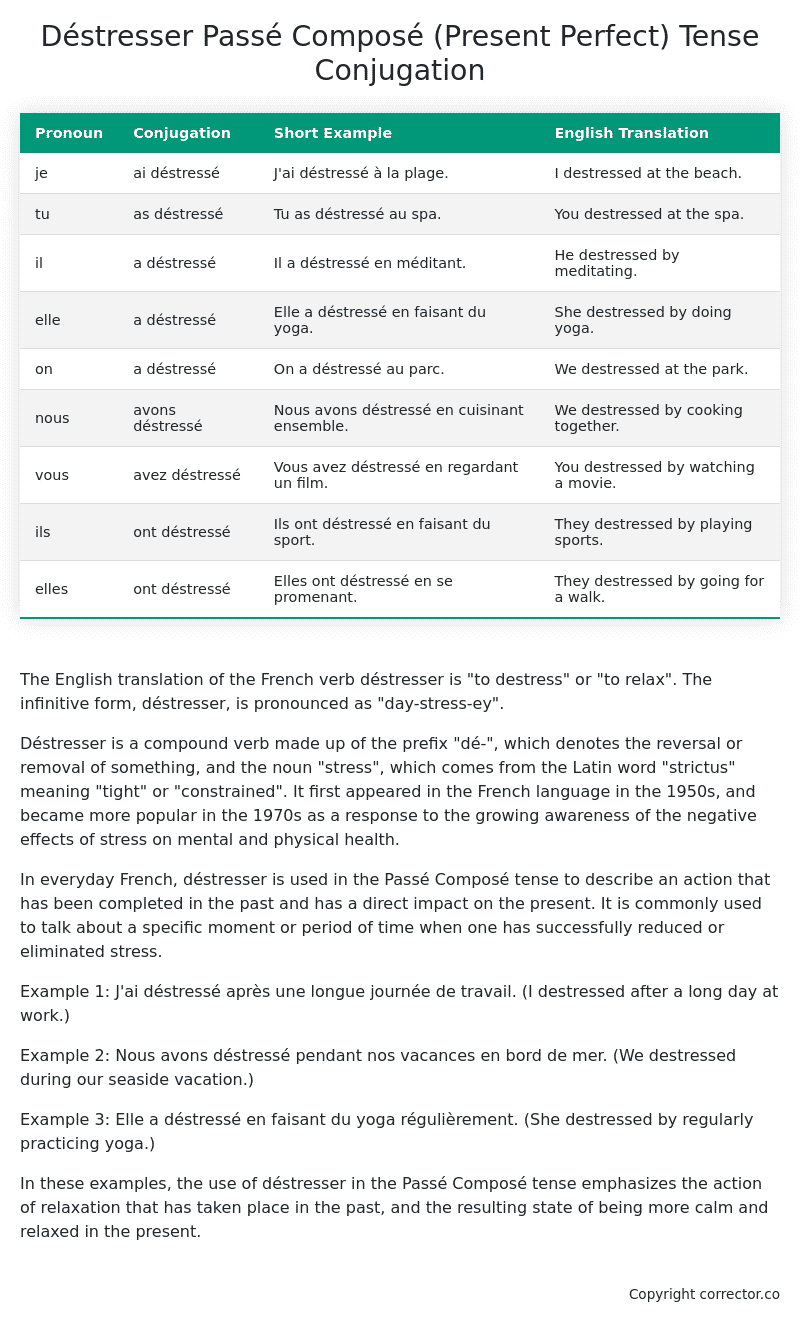Passé Composé (Present Perfect) Tense Conjugation of the French Verb déstresser
Introduction to the verb déstresser
The English translation of the French verb déstresser is “to destress” or “to relax”. The infinitive form, déstresser, is pronounced as “day-stress-ey”.
Déstresser is a compound verb made up of the prefix “dé-“, which denotes the reversal or removal of something, and the noun “stress”, which comes from the Latin word “strictus” meaning “tight” or “constrained”. It first appeared in the French language in the 1950s, and became more popular in the 1970s as a response to the growing awareness of the negative effects of stress on mental and physical health.
In everyday French, déstresser is used in the Passé Composé tense to describe an action that has been completed in the past and has a direct impact on the present. It is commonly used to talk about a specific moment or period of time when one has successfully reduced or eliminated stress.
Example 1: J’ai déstressé après une longue journée de travail. (I destressed after a long day at work.)
Example 2: Nous avons déstressé pendant nos vacances en bord de mer. (We destressed during our seaside vacation.)
Example 3: Elle a déstressé en faisant du yoga régulièrement. (She destressed by regularly practicing yoga.)
In these examples, the use of déstresser in the Passé Composé tense emphasizes the action of relaxation that has taken place in the past, and the resulting state of being more calm and relaxed in the present.
Table of the Passé Composé (Present Perfect) Tense Conjugation of déstresser
| Pronoun | Conjugation | Short Example | English Translation |
|---|---|---|---|
| je | ai déstressé | J’ai déstressé à la plage. | I destressed at the beach. |
| tu | as déstressé | Tu as déstressé au spa. | You destressed at the spa. |
| il | a déstressé | Il a déstressé en méditant. | He destressed by meditating. |
| elle | a déstressé | Elle a déstressé en faisant du yoga. | She destressed by doing yoga. |
| on | a déstressé | On a déstressé au parc. | We destressed at the park. |
| nous | avons déstressé | Nous avons déstressé en cuisinant ensemble. | We destressed by cooking together. |
| vous | avez déstressé | Vous avez déstressé en regardant un film. | You destressed by watching a movie. |
| ils | ont déstressé | Ils ont déstressé en faisant du sport. | They destressed by playing sports. |
| elles | ont déstressé | Elles ont déstressé en se promenant. | They destressed by going for a walk. |
Other Conjugations for Déstresser.
Le Present (Present Tense) Conjugation of the French Verb déstresser
Imparfait (Imperfect) Tense Conjugation of the French Verb déstresser
Passé Simple (Simple Past) Tense Conjugation of the French Verb déstresser
Passé Composé (Present Perfect) Tense Conjugation of the French Verb déstresser (this article)
Futur Simple (Simple Future) Tense Conjugation of the French Verb déstresser
Futur Proche (Near Future) Tense Conjugation of the French Verb déstresser
Plus-que-parfait (Pluperfect) Tense Conjugation of the French Verb déstresser
Passé Antérieur (Past Anterior) Tense Conjugation of the French Verb déstresser
Futur Antérieur (Future Anterior) Tense Conjugation of the French Verb déstresser
Subjonctif Présent (Subjunctive Present) Tense Conjugation of the French Verb déstresser
Subjonctif Passé (Subjunctive Past) Tense Conjugation of the French Verb déstresser
Subjonctif Imparfait (Subjunctive Imperfect) Tense Conjugation of the French Verb déstresser
Subjonctif Plus-que-parfait (Subjunctive Pluperfect) Tense Conjugation of the French Verb déstresser
Conditionnel Présent (Conditional Present) Tense Conjugation of the French Verb déstresser
Conditionnel Passé (Conditional Past) Tense Conjugation of the French Verb déstresser
L’impératif Présent (Imperative Present) Tense Conjugation of the French Verb déstresser
L’infinitif Présent (Infinitive Present) Tense Conjugation of the French Verb déstresser
Struggling with French verbs or the language in general? Why not use our free French Grammar Checker – no registration required!
Get a FREE Download Study Sheet of this Conjugation 🔥
Simply right click the image below, click “save image” and get your free reference for the déstresser present perfect tense conjugation!

Déstresser – About the French Passé Composé (Present Perfect) Tense
Formation of the Passé Composé
Set the auxiliary verb with either
Conjugate the auxiliary verb
Add the past participle
Common everyday usage patterns
Narrating Past Events
Sequential Actions
Describing Completed Actions
Interactions with other tenses
Imperfect Tense
Conditional and Future Tenses
Summary
I hope you enjoyed this article on the verb déstresser. Still in a learning mood? Check out another TOTALLY random French verb conjugation!


